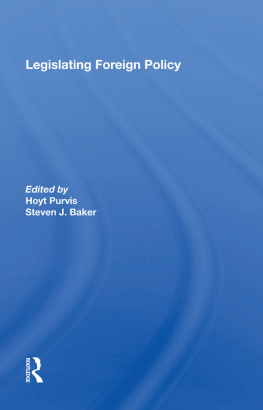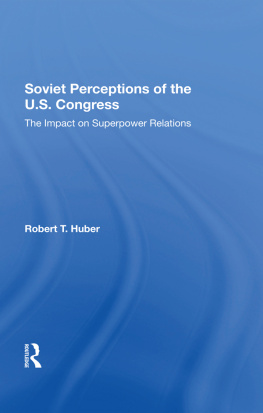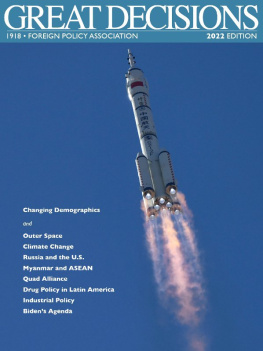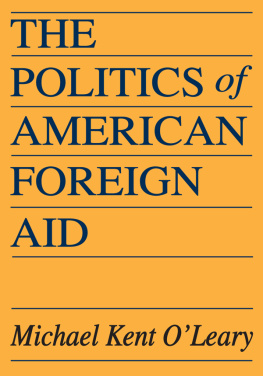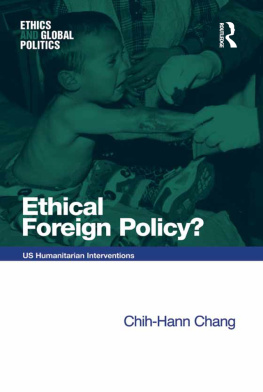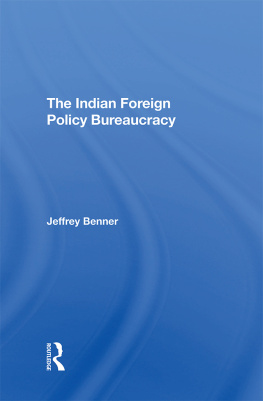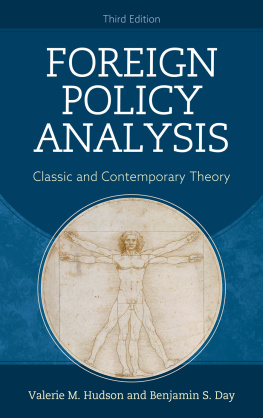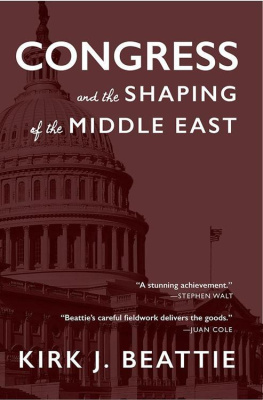Legislating Foreign Policy
Also of Interest
Presidential Leadership and National Security: Style, Institutions, and Politics, edited by Sam G. Sarkesian
The Politics of Resource Allocation in the U.S. Department of Defense , Alex Mintz
Congress and the Presidency in U.S. Foreign Policymaking: A Study of Interaction and Influence, 1945-1982, John T. Rourke
Inside the Legislative Process: The Passage of the Foreign Service Act of 1980, William X, Bacchus
The Legislative Veto: Congressional Control of Regulation, Barbara Hinkson Craig
*The Illusion of Presidential Government, edited by Hugh Heclo and Lester Salamon
*The President, the Budget, and Congress: Impoundment and the 1974 Budget Act, James P. Pfiffner
Inside the Bureaucracy: The View from the Assistant Secretary's desk, Thomas P. Murphy, Donald E. Nuechterlein, and Ronald J. Stupak
Rhetoric and Reality: Presidential Commissions and the Making of Public Policy, Terrence R. Tutchings
The Hoover Commissions Revisited, Ronald C. Moe
*Available in hardcover and paperback.
A Westview Special Study
Legislating Foreign Policy
edited by Hoyt Purvis and Steven J. Baker
Beginning with the premise that Congress has reasserted its role in U.S. foreign policy, the authors of this book describe, analyze, and evaluate how Congress is exercising its formal and informal powers and responsibilities. Five policy studies examine congressional action in major policy areas, placing Congress's behavior in the institutional and political contexts necessary to an understanding and evaluation of the congressional role; in combination, the studies provide an insightful look at some major developments in recent U.S. foreign policy.
Hoyt Purvis is director of the Fulbright Institute of International Relations at the University of Arkansas. He served for many years as an aide to Senator J. W. Fulbright and then as foreign/ defense policy adviser to Senate Majority Leader Robert Byrd. Steven J. Baker is associate professor of international policy studies at the Monterey Institute of International Studies; Dr. Baker was a SALT II consultant and foreign policy adviser to Senator Byrd.
Legislating Foreign Policy
edited by Hoyt Purvis
and Steven J. Baker
First published 1984 by Westview Press
Published 2018 by Routledge
52 Vanderbilt Avenue, New York, NY 10017
2 Park Square, Milton Park, Abingdon, Oxon OX14 4RN
Routledge is an imprint of the Taylor & Francis Group, an informa business
Copyright 1984 by Taylor & Francis
All rights reserved. No part of this book may be reprinted or reproduced or utilised in any form or by any electronic, mechanical, or other means, now known or hereafter invented, including photocopying and recording, or in any information storage or retrieval system, without permission in writing from the publishers.
Notice:
Product or corporate names may be trademarks or registered trademarks, and are used only for identification and explanation without intent to infringe.
Library of Congress Catalog Card Number: 84-50372
ISBN 13: 978-0-367-01710-1(hbk)
This volume is the result of a collaborative effort that began while the editors worked together as congressional staff members concerned with foreign policy and defense issues. After leaving Washington, and while both served on the faculty of the University of Texas, that collaboration continued and work began in earnest on this book.
Based on both our governmental and teaching experience, we see a need for greater attention to the congressional role in foreign policy and international security affairs. Although there have been some noteworthy contributions to the study of Congress' role in the formation and conduct of American foreign policy, too often academic and journalistic treatments of the subject have tended to view Congress' role negatively and out of context. While Congress' shortcomings are thoroughly discussed and analyzed here, we proceed from the conviction that Congress is a factor in American foreign policy, if sometimes only a subordinate factor, and that it is essential to examine Congress' foreign policy involvement in a broader perspective.
American foreign policy cannot be understood without a recognition of the congressional role. Likewise, the congressional role cannot be understood without a recognition of the importance of the legislative process, of politics, and of congressional personalities and procedures.
While we have drawn heavily on our own experience and research in preparing this book, we have also had the benefit of the efforts of three individuals who have worked with us in research and analysis of the congressional role in foreign policy. The contributions of John Opperman, J. Philip Rogers, and Tura Campanella are an important part of this volume.
This book builds around five policy stuaies, wnicn examine and analyze the role of Congress in a wide ) place Congress" behavior in the issue, institutional, and political contexts that are necessary to an understanding and evaluation of Congress' performance.
The book begins with an introductory overview, providing a framework within which the congressional role should be considered, as well as some specific examples of the formal and informal interaction between the legislative and executive branches, and the direct and indirect congressional influence.
introduces explicit criteria for evaluating the congressional performance, and in the concluding chapter the congressional role in each of the policy study areas is evaluated on the basis of those criteria.
Congress reasserted its foreign policy prerogatives in the early 1970s, and much of the existing literature focuses on that important period. Legislating Foreign Policy looks at how Congress is exercising the powers and responsibilities that it earlier recaptured. Each of the policy studies includes a major set of issues dealt with by Congress in the late 1970s and early 1980s. However, there is an effort to provide a broader historical perspective, and each policy study relates the development of these issues over a longer period. In particular, , the limited congressional involvement at the time of the first strategic arms limitation agreement (SALT I) serves as a contrasting background for the more active congressional role in subsequent arms control matters.
The collective product not only describes and analyzes the congressional role, but provides what we believe is an insightful look at some of the major developments in recent American foreign policy. It is intended to be a book that is instructive in its examination of both process and policy. We hope that it will help illuminate each of these areas.
The concept of this book, as well as its development, resulted from a joint effort by the editors. In addition to our individual contributions, Baker developed the evaluative criteria, while Purvis exercised overall editorial responsibility.
The editors are, of course, particularly indebted to the three other contributors to this volume. Additionally, there are a number of individuals who in various direct and indirect ways have been helpful to us in completing the book. Among those to whom we owe gratitude for their comments or suggestions on various aspects of the book are J. William Fulbright, Bruce Buchanan, Len Weiss, Sidney Weintraub, Richard McCall, and William E. Jackson, Jr. A special acknowledgement is due to Esther Purvis for her support and encouragement. Barbara E. Rieper has been especially helpful in doing the word processing and in preparing the manuscript. We also express appreciation to our former Senate staff colleagues and to Robert C. Byrd, with whom we were privileged to work.


